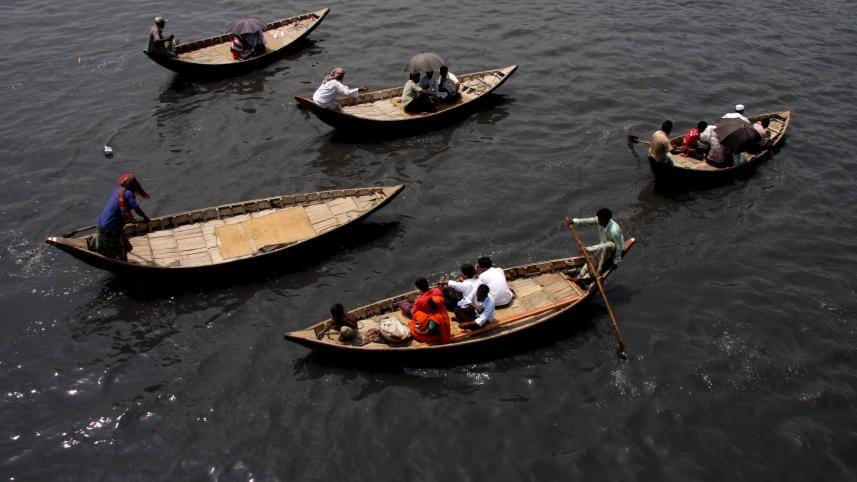Granting rivers legal status can redefine our relationship with nature

Across the world, several rivers have been given legal personhood or recognised as living entities. These rivers are often highly polluted or degraded, yet they remain deeply cherished by the communities that depend on and revere them. Even when a river is sick, we can all take steps to restore it and rebuild a meaningful relationship with it.
This prompts a critical question: can law act as a mechanism of repair to restore our broken relationship with rivers, especially under the framework of "rights of nature?"
Traditionally, water law has treated rivers as mere resources—objects over which humans exercise dominion. Recognising rivers as living or legal entities profoundly challenges this notion. It asserts that rivers are far more than resources; they are beings with intrinsic value. Even before practical enforcement, the symbolic significance of acknowledging the "rights of nature" forces us to reconsider our fundamental relationship with water.
The rights of nature have gained momentum over the past two decades, particularly concerning rivers. However, legal recognition of rivers varies, creating differing scopes of rights, duties, and protections.
Legal person or subject of rights
The concept of a legal person treats an entity as capable of bearing rights and duties—similar to a corporation. This allows rivers to sue, be sued, and possess certain legal protections. For instance, Colombia's Atrato River was recognised by the Constitutional Court as a legal subject, endowed with specific rights to protection, conservation, and restoration. Notably, it was not granted the right to own property or water rights—its rights were confined to what the court explicitly outlined.
Living person
In India, some rivers—such as the Ganga and Yamuna—were recognised as "living persons." This is a legally creative but also complicated concept, as the law typically reserves "personhood" for human beings. Recognising a river as a living person raises perplexing questions: if it is now "dead" due to pollution, is someone criminally liable? Indeed, in the Yamuna's case, a police report was filed for its "homicide." But such recognition blurs boundaries: can a river commit crimes? Does it enjoy human rights? These ambiguities highlight the tension within the legal system when adapting such novel frameworks.
Living entity
The notion of a living entity is more symbolic and carries less legal power. It acknowledges the river as a holistic, living system and challenges exploitative notions of water as a mere resource. However, it does not grant practical rights, such as the ability to litigate or hold property. Despite its legal weakness, this recognition can be transformative in reshaping public and governmental attitudes towards rivers.
The problem of missing water rights
A glaring issue emerges when examining rivers granted legal status: none have been awarded water rights. Even where courts recognise a river's personhood, such as in Colombia, water rights remain absent. Rivers remain disconnected from the legal mechanisms that control access to water, leaving their survival contingent upon human decision-making rather than inherent entitlements.
This gap highlights a profound flaw. Without access to their own water flows, rivers cannot be meaningfully protected. Water rights are essential to ensuring that a river's ecological needs are respected.
In the era of the climate crisis—what many call the Anthropocene—humanity faces environmental challenges on a scale previously unknown. Countries like Bangladesh and India are already suffering the effects of rising temperatures and water crises. In this context, rights of nature, including river personhood, are emerging as radical tools for environmental protection.
Yet, resistance persists. The entrenched disconnect between traditional water law and the idea of rivers as rights holders reflects a broader hesitation to overhaul outdated legal frameworks.
When a river becomes a legal subject, it can challenge harmful development, pollution, and degradation—forcing humans to respect its interests. But this can inadvertently reinforce an adversarial relationship, positioning humans and rivers as competing claimants in courtrooms.
Conversely, recognising a river as a living entity, though legally weak, encourages an ethic of relationality and care. It invites us to view rivers not as objects of use but as partners in a shared ecosystem. This shift moves beyond transactional, extractive models of water governance and fosters reciprocal relationships, where human and river well-being are intertwined.
What can we give to the river?
Historically, society's relationship with rivers has centred on "what can we take?"—focusing on the services rivers provide: water, transport, fish, and hydropower. Even now, this extractive narrative dominates.
However, recognising rivers as living entities introduces new narratives: "what do we want for the river?" and "how do we walk with the river to achieve that vision?" These are profound shifts in perspective. They suggest that rivers should have a voice—represented by guardians, community leaders, or river commissions—and that we must listen to and act on that voice.
In this model, rivers become partners rather than adversaries. Communities engage in collective stewardship, imagining futures where rivers thrive alongside human populations. This is a transformative step towards sustainable coexistence, particularly crucial as climate change accelerates ecological crises.
To ensure that the new legal status of rivers translates into real protection, two critical gaps must be bridged: First, aligning water law with river rights—so that rivers gain the water flows necessary to sustain their ecosystems. Second, shifting societal narratives—from extractive relationships to reciprocal, caring engagements with rivers.
Ultimately, legal personhood or entity status should not simply be symbolic. It should lead to concrete protections, guaranteed water rights, and restored ecological health—allowing rivers to flourish as living beings with whom we share our world.
Mohammad Azaz is researcher and administrator at Dhaka North City Corporation (DNCC).
Views expressed in this article are the author's own.
Follow The Daily Star Opinion on Facebook for the latest opinions, commentaries, and analyses by experts and professionals. To contribute your article or letter to The Daily Star Opinion, see our guidelines for submission.




 For all latest news, follow The Daily Star's Google News channel.
For all latest news, follow The Daily Star's Google News channel. 

Comments